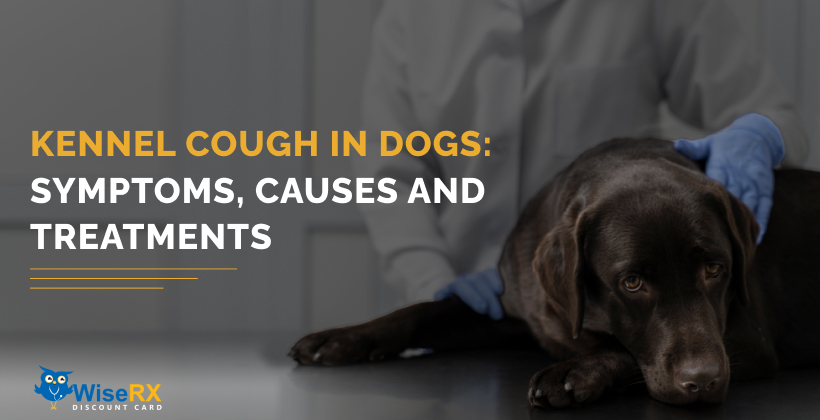
What Is Kennel Cough in Dogs, and How Can we Treat It?
Are you planning to keep your furry friend at a boarding facility for a few days? If yes, you must know that your canine requires vaccination against kennel cough. Canine companionship warms our hearts and fills our lives with joy. Our furry friends are loyal, loving, and cherished family members. Therefore, we are responsible for keeping our pets healthy and ensuring they get all vaccination against diseases.
If you have a plan of boarding stay or travel and are unaware of kennel cough sneezing in dogs, you must read this blog. You can use a pet medication discount to save money on pet medication.
Kennel cough in dogs
Kennel cough is a famous canine infectious tracheobronchitis that target the respiratory system. It is highly contagious. When a dog comes in close contact with an infected dog, especially in dog parks, and shelters, the chances of transmission increase. Like cold and cough in humans, this infection transmits through airborne droplets released during coughing or sneezing.
What are the symptoms of Kennel cough?
The common symptoms of kennel cough are goose honk, swollen tonsils, runny eyes and nose, wheezing, loss of appetite, and depressed behavior. You must check with the vet if you notice any of these symptoms in your dog.
What causes kennel cough in dogs?
There are different bacteria and viruses that cause kennel cough in dogs. Here they are:
- Sometimes bacteria named Bordetella bronchiseptica can be the culprit of kennel cough. These bacteria cause inflammation in the upper respiratory tract of your dog.
- The most common reason for kennel cough in dogs is the Canine parainfluenza (CPIV) virus. When a dog gets infected with this virus, it gets similar symptoms like canine influenza. Symptoms may be the same, but dogs need different vaccination for both.
- Canine adenovirus 2, or you can call it CAV-2 or infectious canine laryngotracheitis virus, causes kennel cough. It spreads from one dog to another through a cough.
- Canine distemper can be transmitted through the air from one dog to another, through shared water dishes and food, or passed down from a mother to her pups in the womb.
How to treat kennel cough in dogs?
The first thing you must do when you witness any signs of kennel cough in your dog is take it to a nearby vet. The vet examines the dog’s condition and recommends rest for a few weeks. Besides this, they will prescribe steroids, anti-inflammatories, and cough suppressants, so your dog feels more comfortable. You can buy these prescribed kennel cough medications at lower prices using a free prescription discount card.
To see the seriousness of your disease, the vet can prescribe antibiotics too. Antibiotics kill bacteria causing kennel cough and prevent the risk of getting a secondary infection. During treatment, ensure your dog doesn’t come in contact with other dogs. It would be best to use disinfectant to clean your floors to prevent recurrence.
Don’t give your dog human cough or cold medicines besides vet-prescribed medication and rest. And keep a few things in mind to make your dog more comfortable.
- During treatment, provide an exceptionally clean, warm place for your dog to rest.
- Let your dog lead for walking. Also, use a harness, not a collar. It will help to reduce irritation to the windpipe.
- Use a damp towel to clean the discharge from the dog’s eyes and nose.
- Run a humidifier. It will moisten your dog’s air passages.
- Ensure your dog is in a clean, ventilated area.
Is kennel cough contagious to humans?
There are rarest chances to transmit kennel cough to humans. As mentioned above, bordetella bronchiseptica causes kennel cough, and people with weak immune systems like HIV, cancer, and other chronic illness should take extra precautions. However, the chances of humans contracting kennel cough are still minimal.
Conclusion
Kennel cough may be a common ailment among dogs, but it can be easily manageable with awareness and proper care. Remember to stay vigilant, prioritize prevention measures, and seek veterinary advice promptly if your dog displays any concerning symptoms.
As pet owners, it’s essential to prioritize our pet’s health and well-being. You can provide the best care for your furry friend and use pharmacy discount card without worrying about overwhelming medical expenses. After all, a healthy and happy pet makes for a happy home!
FAQ
1. What are the common symptoms of kennel cough in dogs?
The symptoms of kennel cough typically include a dry, honking cough that may sound like retching.
Other signs may include nasal discharge, lethargy, reduced appetite, and, occasionally, mild fever.
While most cases are mild and resolve without intervention, certain dogs, such as puppies or poor immune systems, may experience more severe symptoms.
2. What are the best treatments for dogs with kennel cough?
Most cases of kennel cough resolve without specific treatments. However, to alleviate symptoms and speed up recovery, rest is essential. Providing a comfortable environment and using a humidifier to moisten the air can help ease coughing. Cough suppressants formulated for dogs. In bacterial cases, the vet prescribes antibiotics to combat the infection.


